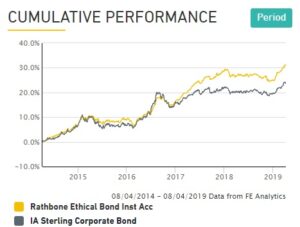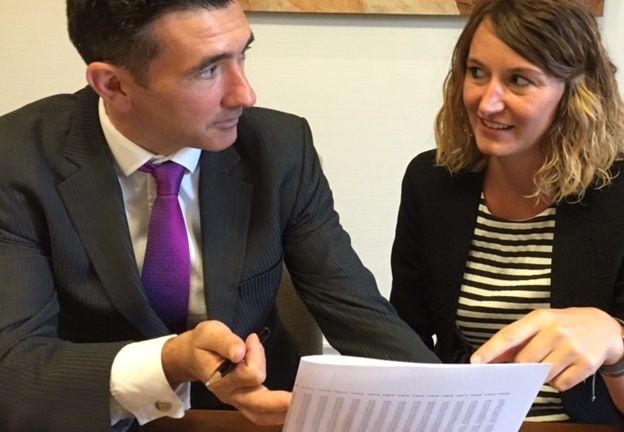Fund selectors unsure of the credentials of ethical funds, might need less convincing if they see the recent performance of the Rathbone Ethical Bond Fund.
The fund, which sits in the Investment Association’s Sterling Corporate Bond sector, has been gradually pulling away from the sector average over the past two years, according to data from FE Analytics.

Boasting a top quartile performance over both three and five year periods, it focuses on high-quality investment grade bonds, excluding issuances from companies involved in armaments, environmental harm, tobacco, nuclear power, alcohol production, pornography, gambling or human rights violations.
Despite these exclusions, the fund’s management team – Bryn Jones and Noelle Cazalis (pictured) – is keen that its performance be compared to all the funds in the IA’s Sterling Corporate Bond fund sector.
“We see our peer group as the wider sector,” Cazalis says proudly. “We are seeing a lot of mainstream investment coming into ethical funds. That has been one of the biggest shifts in the market in recent years.”
Financial exclusion
Cazalis explains that the fund also excludes issuances from organisations involved in “predatory lending”, although the definition of “predatory” is one that is subjective. Cazalis says the fund recently decided not to invest in bonds issued by Provident Financial on the grounds that the issuer did not meet its criteria.
However, the fund does hold bonds from Paragon Banking Group, Clydesdale Yorkshire Banking Group and Lloyds Bank – all of which have operated in the sub-prime lending market.
Cazalis says those financial organisations that pass the ethical test do so because of their “core operations” and because the investment team shows their practices to be “best in class”.
“We look at what is core, and how those companies are addressing any issues,” she explains. “All of the banks don’t pass our criteria.”
Interestingly, some of the UK challenger banks fail this test.
Cazalis says that the fund has trimmed its exposure to these companies in recent months, including the disposal of bonds issued by Metro Bank, after the fund’s investment team met with the company.
“We don’t like the challenger banks,” she says, but explains that building societies are far more appealing, noting issuances from Nationwide and Coventry building societies as being particularly appealing to bondholders.
Sustainable innovation
Away from financial services, the fund has invested in some innovative issuances, including charity bonds and assets supporting clean energy and gender equality.
“Charities tend to be conservatively managed,” says Cazalis. “Their stable cashflows are exactly what bondholders are looking for. From a diversification standpoint, charities are really interesting.”
One of the issuers that the team has embraced was a bond issued by Belong, a care home operator which aims to ensure individuals with dementia are able to continue living in their own household, even when their condition deteriorates.
Other bonds that the fund has chosen include the QBE Gender Equality Bonds and issuances from the Greencoat Investment Trust and Property Assessed Clean Energy – or PACE.
Inverted process
The fund’s investment process isn’t benchmark driven and takes a different path to asset screening than other sustainability funds. Like most standard bond funds in the sector; idea formulation, credit, valuation and risk analysis are conducted across the investable universe before any member of the team makes any input on ethical issues.
While governance issues may be considered part of the initial investment idea formation, the screening of assets doesn’t take place until the end of the process, ensuring that investment cases are fully formed before environmental, social and governance concerns are weighed up.
Ethical issues are scrutinised by a separate ethical research team. Rathbones’ head of ethical research Perry Rudd, ethical researcher Kate Elliot and stewardship director Matt Crossman, comb over the bonds being considered for investment and can veto investments that don’t meet the agreed criteria.








